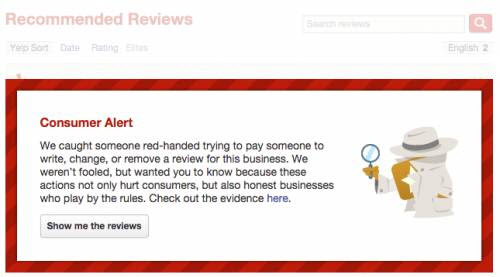 Getting happy customers/clients/patients to speak up and write online reviews is usually tough. Even if you do everything you should, it’s still tough going. Not all the happy people will speak up, and there’s always a chance the unhappy few will.
Getting happy customers/clients/patients to speak up and write online reviews is usually tough. Even if you do everything you should, it’s still tough going. Not all the happy people will speak up, and there’s always a chance the unhappy few will.
If you’re wise, you’ll realize you can’t get to perfect, but that you can always get closer and that the payoff is worth the effort. So you’ll continuously work on your strategy.
On the other hand, you might have considered at least one shortcut to get more reviews and better reviews. I bet I know what you’re considering. I hope you don’t do it, but if you do it anyway, I’d at least like you to know the arguments against it.
Here are 10 all-too-common “review shortcuts” some business owners try to take, and why you might not want to be one of them:
Watching over reviewers’ shoulders.
Maybe you set up an iPad in your office, and walk reviewers through exactly what to do, while you’re in the same room. That’s noble, and you probably just do it because you want to make the process hassle-free. But there are downsides.
Why it’s a mistake:
- Many reviews won’t look like honest opinions because they won’t be honest opinions. How can reviewers say what they really think if you’re standing there?
- The unhappy people will decline to use your review station, or they’ll get even more steamed if they felt “pressured.” Either way, they’re just as likely to write you a bad review anyway. “Quality control” it is not.
- The happy people may not feel at liberty to take their time and go into detail about why you’re great. You want them to.
- It’s against Google’s rules.
Holding a contest.
You ask people to review you because you’ll donate to charity, or because you’ll pick a “review of the month,” or something like that.
Why it’s a mistake:
- It’s illegal or legally questionable.
- It’s against most review sites’ policies.
- You’ll get short, unhelpful, artificial-looking reviews from people who just want the freebie.

“Getting the ball rolling” with reviews from family, friends, colleagues, etc.
You plan to get real reviews at some point, but don’t want your first reviewers to feel uncomfortable, and you don’t want your business to look unpopular in the meantime.
Why it’s a mistake:
- It’s against Google’s rules and Yelp’s rules.
- It’s illegal or legally questionable.
- It’s unnecessary if you’ve got reviews from real customers.
- For would-be customers it just calls into question the authenticity of your real
- It looks sad and desperate if you’ve got no reviews from real customers.
Reviewing yourself.
Why it’s a mistake:
- See answers to “Get the ball rolling” shortcut, above.
- It will probably get filtered eventually.
Posting on behalf of customers.
They sent you perfumed letters to say they feel, but they didn’t post online reviews, which are what you really want. You don’t want to bother them with that process, so you figure you’ll publish their reviews for them. They’re the same words, so what’s the problem?
Why it’s a mistake:
- Either you have to impersonate your customers/clients/patients, or you have to say in your review that you’re posting on their behalf. “Bad optics,” as they say in Washington. You raise more questions than you answer.
- The reviews you post are more likely to get filtered.
- What if those people see “their” reviews and say you never had permission to post their review?
Offering incentives.
You offer a gift card, or free service next time, or a discount, or enter customers into a raffle. People are so busy, and they won’t bother to review you unless you grease the skids, right?
Why it’s a mistake:
- Even if it works, you’ll get unimpressive, bare-minimum reviews from customers who just want free stuff.
- It’s illegal or legally questionable.
- You may have hell to pay if you’re a doctor or a lawyer.
- It’s against most review sites’ policies.
- It will offend some people, who would have been perfectly willing to write you a good review if you didn’t imply that you can just buy their praise.
- The person you’re trying to get a review from may not believe your reviews anymore.
- Armed with that knowledge, there will be murder in your competitors’ eyes.
Having marketers or so-called SEOs review you.
Hey, you pay them good money, and their job is to help you make rain, and reviews can help with that, so what’s the harm? You’ll even do some work for them so they’re technically your “customer.”
Why it’s a mistake:
- They’re usually poor writers. (Especially the SEOs.)
- Either they disclose the relationship or they write a Jell-O review with no specifics.
- There’s a good chance your competitors know the name and face, because the marketer may have tried to pitch them on working together. It’ll be an SEO soap opera full of “Before there was us” and “But I thought you knew” and “How could you!” Probably won’t end well.
- It’s illegal or legally questionable.
- It’s against most review sites’ policies.
Swapping reviews.
You refer people to Fred. Fred refers people to you. You won’t pretend to be each other’s clients, but Fred can tell the world what you’re made of, and you’ll do the same for him.
Why it’s a mistake:
- Either your reviews are mutually useless, or both of you have to lie through your teeth.
- It looks shady.
- You hitch a little piece of your reputation to someone else, whom you can’t control.
Including a gag clause to prevent negative reviews.
Maybe you’ve had crazy people take a hatchet to you in online reviews in the past, and you don’t need more of that right now. If they have a problem, they can take it up with you and you can probably, but they can’t malign you publicly or you’ll sue them into the Stone Age.
Why it’s a mistake:
- You know how they say “love will find a way”? Well, rage will also find a way. Angry customers will find a way to get the word out – about the original issue, and about your effort to silence them. (See “Streisand effect.”)
- Your reviews will look too good to be true. Some people will question their authenticity.
- Your competitors will cause you all sorts of misery if they find out.
- You miss out on the benefit of letting would-be customers see how you handle problems. As Matt McGee says, we don’t live in a 5-star world. If you get a bad (or even illegitimate) review and respond to it in a classy way, you look good. Perhaps even better than if you had no reputation warts. People love a comeback.
Buying reviews.
Happy customers don’t want to speak up. The crooked competitors do it, and they’re making off like bandits. Google and Yelp don’t filter their reviews, but seem to filter all your good ones. It’s not fair. You wish you could think of another way, and you want to get more real reviews eventually, but you’re losing money, so what else can you do?
Why it’s a mistake:
- The reviews will range from mush to gibberish to lies.
- It’s against Google’s and Yelp’s and other sites’ rules.

- Real customers may call you out.
- Competitors will call you out.
- It’s lazy.
- It’s illegal.
- It looks shady.
- It is shady.
- It’s a missed opportunity to get to know your customers better.
Gee, thanks, Mr. Killjoy. Sounds like I can’t do much of anything. How SHOULD I get reviews?
Read these posts and apply the suggestions:
How to Execute the Perfect Local Reviews Strategy
Principles For A Review Plan: Considerations in Encouraging Customer Reviews
60+ Questions to Troubleshoot and Fix Your Local Reviews Strategy
How to Remove Fake Google Reviews
The Ridiculous Hidden Power of Local Reviews: Umpteen Ways to Use Them to Get More Business
—
Is there a “reviews hack” you’re considering?
Can you think of any other counterproductive shortcuts?
Have you tried an approach that didn’t help you get reviews the way you thought it would?
Leave a comment!
